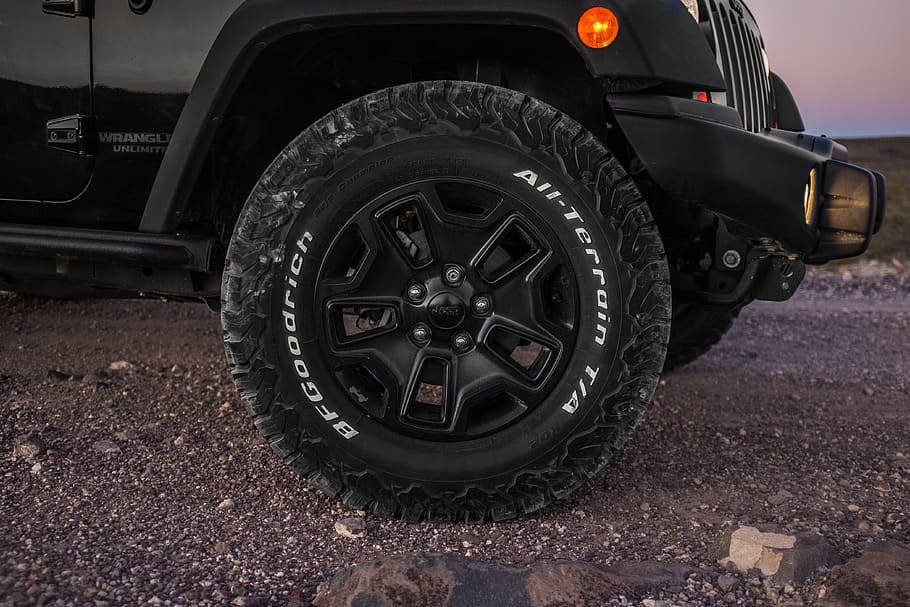Jeep Wrangler is a 5-seater SUV for off-roading enthusiasts who love to explore challenging terrains. However, a key component often overlooked in such adventures is the type of tires you choose for your vehicle. Believe it or not, the right tires can make all the difference in handling, traction, and durability on such rough terrains. For instance, all-terrain tires can handle a wide range of conditions but may not excel in specific environments such as mud or snow. On the other hand, mud-terrain tires are designed specifically for off-road conditions and excel in muddy or rocky terrains.
Additionally, the load capacity of your tires is crucial, and you must ensure that they support the weight of your vehicle and any additional gear. Understanding these factors help in choosing the right tires for your Jeep Wrangler and ensures a safe and enjoyable off-road experience. But first, let’s understand the different types of Jeep Wrangler.
Types of tires for Jeep Wrangler
There are several types of tires for Jeep Wrangler, each with its advantages and disadvantages.
All-Terrain Tires
All-terrain tires perform well on gravel, dirt, and pavement terrains. These tires have a more aggressive tread pattern than standard highway tires. Thus, providing better traction in off-road conditions. While they may not be as effective in extremely muddy or rocky conditions as dedicated mud-terrain tires, all-terrain tires are a versatile option for your Jeep Wrangler to handle various conditions.
Mud-Terrain Tires
An easy way to enhance your Wrangler's off-road performance significantly is to consider a mud-terrain tire. These tires offer more space between the lugs and larger, deeper tread blocks, significantly boosting off-road capability. Unlike older models, modern mud-terrain tires are quieter on the road. Although they are designed for muddy terrain, they can outperform all-terrain tires in most off-road situations.
All season tires
All-season tires are designed to perform adequately in various weather conditions, including dry, wet, and light snow. While they may not be great in extreme weather, they offer a good balance of performance and longevity. They also have a more aggressive tread pattern than standard passenger tires and may feature siping for improved grip in wet conditions. These tires help drivers who don't want to switch tires between seasons and need a tire that can handle varied driving conditions.
Factors You Must Look Into When Selecting Tires for Jeep Wrangler
When choosing the best option for your driving needs, here are some essential factors to look into:
The weight
If you want to pick bigger tires for your car, know that they will probably be heavier. This can affect your car's performance and also use more gas. You can find out the weight of the tire on the manufacturer's website and compare them before you buy. But remember, weight is not the only thing you should consider when choosing a tire.
Sidewall
Compare two tires of the same size from different companies; you will notice that one tire is heavier than the other. This is mainly because more material is used in heavier tires. In turn, this implies that a heavier tire with more material has a stronger sidewall. This is essential for people who like to take their Jeep Wranglers on tough off-road trails. A stronger sidewall is worth having a heavier tire for serious off-road enthusiasts. However, on newer and heavier Jeep Wrangler models, a heavy-duty sidewall only affects the ride quality slightly.
Road Noise
Consider spacing between the lugs to know whether the selected tire will be noisy on the road or not. If the spacing is large and the tread is staggered, you're more likely to experience noise when driving on the highway. This is the reason why all-terrain tread patterns are more tightly spaced.
Sipes
The small grooves that run across the tread block of a tire are called sipes, and they play a crucial role in providing grip on wet roads. Mud terrain tires have fewer sipes than all-terrain tires. If you frequently drive your Jeep on wet roads, looking for a tire with plenty of sipes is essential to ensure good traction.
Longevity
Unlike all-terrain tires with a guarantee, finding a mud-terrain tire with a mileage guarantee is difficult. While everyone wants to enhance the lifespan of their tires, this is particularly important for those with long commutes. So, if durability is a top priority, opting for an all-terrain tire instead of a mud-terrain tire is far better.
Snow
If you're planning to drive your Wrangler more often in snowy conditions, having a tire with a 3-Peak Mountain Snowflake rating is vital. These tires have a specialized tread compound and pattern designed to perform well in winter weather. Some are even engineered to be compatible with studs, making it easy to equip them if necessary.
Load Rating
Before buying a new tire for your Jeep Wrangler, check its load rating correctly. The load rating can be found on the sidewall of the tire or on the manufacturer's website. Light Truck (LT) tires have a higher load rating than Hard Metric (passenger) tires, so choose the right option for your Jeep. If your Jeep has undergone major modifications, the standard curb weight listed in the owner's manual may need to be revised. Therefore, taking your Jeep to a weigh station is suggested to determine its weight. While LT tires may be slightly heavier than Hard Metric tires, they are better suited for serious off-roading. If you plan on doing more off-roading than driving on pavement, LT tires are the better choice.
Conclusion
Selecting the right tires for your Jeep Wrangler can significantly impact its performance, handling, and safety. Whether you're looking for better off-road capabilities or improved fuel efficiency on the highway, it's essential to consider various factors such as tread pattern, tire size, load rating, and seasonal requirements.
By researching and understanding your driving needs, you can confidently choose the best tires for your Jeep Wrangler and enjoy a smoother, safer, and more enjoyable ride.

